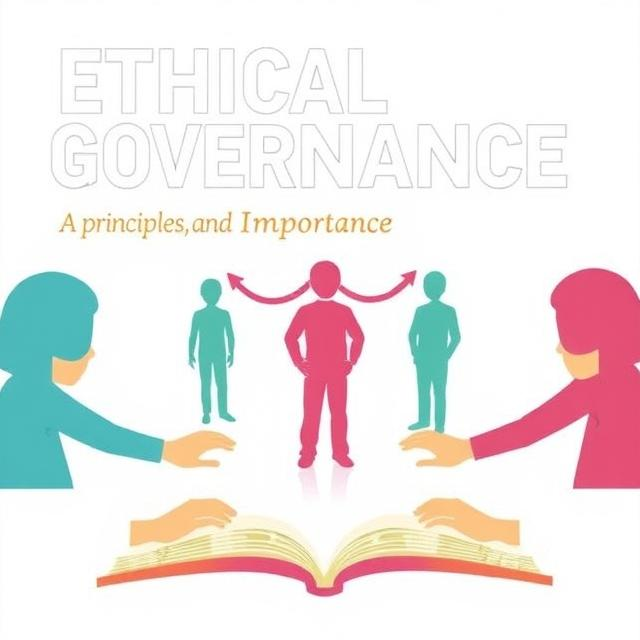Ethical governance refers to the principles and practices of managing public affairs, policies, and public institutions in a manner that is fair, transparent, accountable, and responsible. It ensures that decisions made by public administrators, elected officials, and institutions align with societal values, legal standards, and moral principles. Ethical governance is not only concerned with adhering to the rule of law but also with promoting fairness, justice, integrity, and the welfare of all citizens. It is the cornerstone of building trust between the government and the public and ensuring that public resources are used judiciously to benefit society as a whole.
In a democratic society, ethical governance plays an essential role in upholding the rule of law, fostering economic and social development, promoting human rights, and ensuring equality. However, achieving ethical governance requires ongoing commitment from public officials and institutions to act with transparency, accountability, and integrity in every decision and action they take.
1. Key Principles of Ethical Governance
Ethical governance is built upon several key principles that guide the behavior of public officials, the formulation of policies, and the overall functioning of government institutions. These principles include:
a. Integrity
Integrity is one of the fundamental principles of ethical governance. It refers to the adherence to moral and ethical standards, as well as the commitment to honesty, transparency, and fairness in all actions and decisions. Public officials must avoid corruption, fraud, and conflicts of interest to maintain the trust of the public.
In the context of ethical governance, integrity ensures that public servants and elected officials act in the best interests of society rather than for personal gain. This means making decisions based on objective criteria, free from bias, and in a manner that is consistent with the values of fairness and justice.
b. Accountability
Accountability is a core component of ethical governance. It means that public officials and institutions are responsible for their actions, decisions, and policies. Ethical governance demands that public servants are held accountable to the public, and that they are transparent about how decisions are made and how public resources are used.
Accountability ensures that any actions that violate the public trust or fall short of ethical standards are identified and addressed promptly. Public officials must be willing to accept responsibility for their mistakes, learn from them, and implement corrective measures to avoid repeating them in the future.
c. Transparency
Transparency refers to the openness of government institutions in making decisions, implementing policies, and managing public resources. In ethical governance, transparency is crucial because it allows the public to have insight into government activities and decision-making processes. When decisions are made transparently, it fosters trust between the government and the citizens, as the public feels confident that their government is acting in their best interest.
Transparency also includes ensuring that information regarding public spending, procurement, and policy implementation is readily available and accessible to all stakeholders.
d. Fairness and Equity
Ethical governance emphasizes the importance of fairness and equity in policy-making and decision-making. Public policies and decisions should be made without favoritism or discrimination. Every individual, regardless of their background, should have equal access to public services and opportunities. This ensures that no group or individual is unjustly marginalized or excluded from the benefits of governance.
Fairness also means that policies should be designed to promote social justice and reduce inequality, addressing the needs of the most vulnerable members of society. Ethical governance seeks to create a just society where everyone has the opportunity to thrive.
e. Respect for the Rule of Law
One of the essential aspects of ethical governance is respect for the rule of law. Public officials must abide by the laws of the land and act in accordance with legal and constitutional frameworks. Ethical governance involves ensuring that government actions are within the limits set by the law and that no one is above the law, including public officials themselves.
Respect for the rule of law also ensures that the legal rights of individuals are protected, and that justice is administered fairly and impartially.
2. The Importance of Ethical Governance
Ethical governance is crucial for several reasons. It not only ensures the effective functioning of government institutions but also builds public trust and strengthens democratic values. The importance of ethical governance can be understood through the following points:
a. Building Public Trust
Ethical governance plays a significant role in building public trust in government institutions. When citizens see that their government is acting with integrity, transparency, and accountability, they are more likely to have confidence in the government’s ability to serve their interests. Public trust is fundamental to the legitimacy of the government, and it encourages citizen participation in the democratic process.
On the other hand, unethical governance, such as corruption or cronyism, undermines public trust and erodes the relationship between the government and its citizens. This can lead to disillusionment, disengagement, and even social unrest.
b. Promoting Social Justice
Ethical governance promotes social justice by ensuring that policies and actions are fair and equitable for all citizens. It provides a foundation for reducing social inequality, addressing discrimination, and protecting the rights of marginalized groups. By adhering to ethical principles, governments can create inclusive policies that promote equal opportunities for all citizens.
For example, policies that promote gender equality, protect the rights of minorities, or provide social safety nets for the poor are manifestations of ethical governance that contribute to social justice.
c. Sustaining Democracy
In democratic societies, ethical governance is essential for the sustainability of democratic values and processes. It ensures that elected officials and public servants remain accountable to the public and operate within legal frameworks. Ethical governance prevents the concentration of power and encourages checks and balances within the government system.
When public officials act ethically, it ensures that power is exercised responsibly and that government decisions are made for the benefit of the people. This fosters a political culture that values participation, debate, and the protection of democratic institutions.
d. Preventing Corruption and Abuse of Power
One of the most significant consequences of unethical governance is the proliferation of corruption and the abuse of power. When public officials engage in corrupt practices or abuse their authority, it undermines the effectiveness of public administration and diverts resources meant for public welfare. Ethical governance helps prevent corruption by promoting transparency, accountability, and the rule of law.
Governments that adhere to ethical principles create systems of oversight and accountability that help prevent abuse of power. Independent institutions, such as anti-corruption commissions and ombudsman offices, play a critical role in maintaining ethical governance and investigating cases of corruption and misconduct.
3. Examples of Ethical Governance
a. Singapore’s Approach to Ethical Governance
Singapore is often cited as a model for ethical governance due to its strong emphasis on transparency, integrity, and accountability. The government of Singapore has implemented a zero-tolerance policy toward corruption, and its leaders are held to high standards of ethical conduct. The country’s Corrupt Practices Investigation Bureau (CPIB) is an independent agency responsible for investigating corruption in both the public and private sectors.
One example of ethical governance in Singapore is its approach to public procurement. The government ensures that public contracts are awarded based on merit and that there is transparency in the bidding process. This has helped Singapore build a reputation for efficient and ethical governance, attracting foreign investment and ensuring the welfare of its citizens.
b. New Zealand’s Political Ethics and Accountability
New Zealand is another example of a country with a strong ethical governance framework. The country’s public sector is characterized by a commitment to transparency and accountability. For instance, New Zealand’s State Services Commission (SSC) is responsible for promoting ethical conduct within the public service, providing guidance on issues such as conflicts of interest, transparency in decision-making, and accountability for public spending.
New Zealand’s Official Information Act 1982 ensures that government documents and information are accessible to the public, promoting transparency in governance. The country is also known for its high standards of political integrity, with public officials held accountable for any misconduct. This has contributed to New Zealand’s reputation as one of the least corrupt countries in the world.
c. Ethical Governance in Local Governments
At the local government level, ethical governance is also essential for ensuring that public services are provided fairly and efficiently. For example, in many cities, local governments have adopted codes of ethics that guide the behavior of elected officials and civil servants. These codes address issues such as conflicts of interest, bribery, and transparency in the decision-making process.
A good example is the Ethics Commission in New York City, which works to ensure that public officials and employees follow ethical guidelines and comply with conflict-of-interest rules. The commission also investigates complaints of unethical behavior and takes corrective action when necessary.
4. Challenges to Ethical Governance
While ethical governance is critical to the success of public administration, there are several challenges that governments face in upholding ethical standards:
- Corruption: Despite efforts to promote ethical governance, corruption remains a persistent challenge in many countries. In some cases, corruption is deeply embedded in political systems, making it difficult to root out.
- Political Pressure: Public officials may face pressure from political parties, lobbyists, or powerful interest groups to make decisions that are not in the best interest of the public. This can lead to conflicts of interest and unethical behavior.
- Lack of Accountability: In some countries, institutions that are responsible for ensuring accountability, such as anti-corruption bodies or auditors, may be weak or ineffective, making it difficult to address ethical violations.
5. Conclusion
Ethical governance is the foundation of a just, accountable, and transparent government. It ensures that public officials make decisions based on integrity, fairness, and transparency, and that public institutions serve the welfare of all citizens. By adhering to ethical principles, governments can promote social justice, prevent corruption, and build public trust, ultimately contributing to the development of a prosperous and harmonious society. However, achieving ethical governance requires continuous commitment, oversight, and reform to address the challenges that may arise in maintaining high standards of integrity.




